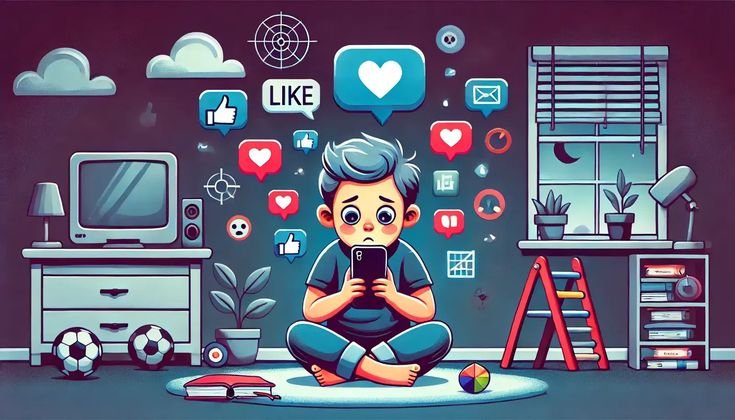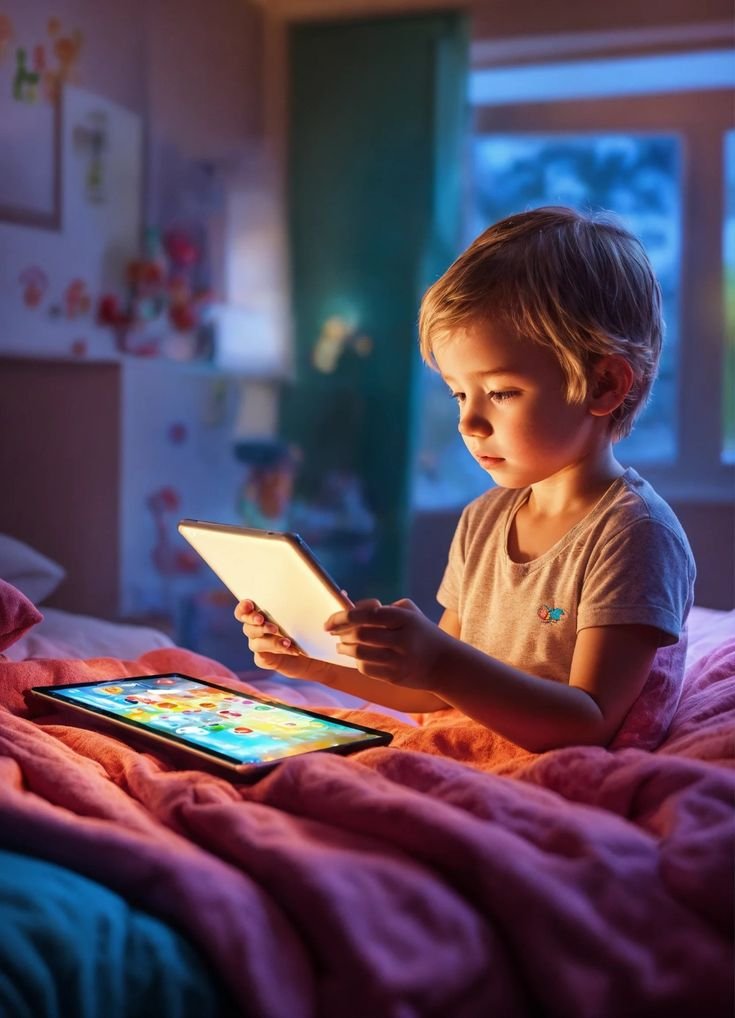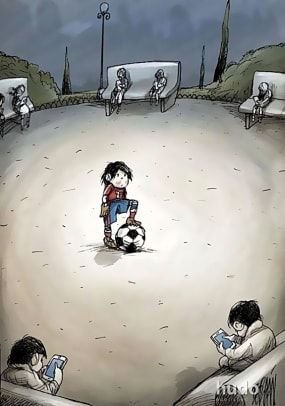Table of Contents
Introduction: The Growing Concern of Mobile Overuse

In today’s digital era, mobile phones have become an inseparable part of our lives. While they offer convenience, learning, and entertainment, the downside is often overlooked—especially when it comes to children. Mobile addiction is a silent but growing problem that’s changing the way children play, learn, and connect with the world around them. A few years ago, Karan, a 9-year-old who used to love drawing and playing cricket, gradually started spending more and more time on his tablet. His parents initially welcomed it as a way to keep him engaged, but soon noticed his lack of interest in everything else. This story mirrors thousands of households today.
Understanding Mobile Overuse

Mobile overuse refers to the excessive or uncontrolled use of smartphones or tablets that starts affecting a child’s physical, emotional, and mental well-being. It’s not just about how much time kids spend on devices but how that time replaces essential activities like playing outside, socializing, sleeping well, or focusing on studies. Research from the Indian Academy of Pediatrics shows that children aged 5–14 in urban areas often spend over 3 hours a day on screens—well above the recommended limits.
Children addicted to mobile devices may struggle with concentration, have difficulty sleeping, and may experience anxiety or irritability when their device is taken away. Physical symptoms such as poor posture, headaches, eye strain, and lack of physical activity are also common. Mentally, it narrows their ability to imagine and think creatively. Emotionally, it creates dependency and detachment—from family, friends, and even their own feelings.
Why Mobile Overuse Happens So Easily?

One reason mobile addiction creeps in quietly is because it often begins with good intentions. Parents hand devices to kids during meals or while working, thinking it’s a harmless distraction. But mobile apps and videos are designed to be addictive. They release dopamine—the feel-good chemical—making children crave more. Over time, screen-based entertainment overshadows real-world joy. Children begin preferring screens over swings, silence over conversation, and fast-paced visuals over imaginative play.
What makes this issue more complex is that children often don’t realize what they’re missing. They may appear content, but inside, they’re losing their ability to focus, create, and communicate without digital assistance. Mobile overuse isn’t just about time—it’s about what’s being lost in that time.
Steps Parents Can Take to Break the Cycle
The good news is that mobile overuse in kids can be managed with patience, structure, and the right tools. Start by setting simple but consistent boundaries around device use. Limit screen time to one hour of recreational use a day. Make clear rules such as “no phones at the table” or “no screens after 8 PM.”

Introduce engaging offline alternatives. Kids won’t stop using screens unless they find something equally rewarding. Activities like board games, crafts, outdoor sports, or storytelling help bring back real-world excitement. Even small activities like cooking together or doing puzzles can work wonders.
Use tools like the Focus Fun app, designed to turn screen reduction into a game. With offline challenges, fun rewards, and easy tracking, the app encourages kids to participate willingly, not forcefully.
Also, be a role model. If you’re scrolling your phone during meals, your child will do the same. Prioritize face-to-face time. Show your child how fun life can be without screens.
Lastly, talk openly. Ask them how they feel after long screen time. Are they happy, tired, or bored? Let them reflect on their habits and involve them in finding balance.
Creating a Healthier, Happier Home

Mobile overuse doesn’t happen overnight, and breaking the habit won’t either. But with consistent effort and care, children can rediscover the joys of a balanced life. Karan, the boy who was once glued to his screen, now looks forward to evening games with his cousins and weekend crafts with his mom. His energy and curiosity have returned—not because screens were banned, but because they were balanced.
As parents, we have the power to guide our children toward healthier choices. Don’t wait until the signs become problems. Start now. Encourage conversation, foster creativity, and make real-life playtime a part of every day. Because the damage caused by mobile overuse may be silent, but the healing can be joyful, loud, and lasting
❓FAQs
Q1: What is mobile overuse in children?
Mobile overuse in children refers to the excessive and uncontrolled use of smartphones, tablets, or other digital devices. It becomes a concern when it interferes with essential daily activities such as sleep, studies, physical play, and social interactions. Over time, mobile overuse can cause emotional, cognitive, and physical issues in growing kids.
Q2: Why is mobile overuse harmful for child development?
Mobile overuse negatively impacts a child’s development by reducing attention span, creativity, and emotional regulation. Children who overuse screens often show signs of anxiety, social withdrawal, and struggle with problem-solving and communication skills. It can also lead to physical problems like poor posture, eye strain, and lack of exercise.
Q3: What are the early signs of mobile overuse in kids?
Some common signs of mobile overuse include irritability when devices are taken away, loss of interest in outdoor play, declining academic performance, sleep issues, and social withdrawal. If your child prefers screen time over real-world activities consistently, it could indicate early stages of mobile overuse.
Q4: How much screen time is safe for children?
Experts, including the World Health Organization, recommend no more than 1–2 hours of recreational screen time per day for children aged 5 to 12. Consistently exceeding this limit increases the risk of mobile overuse and its related effects on mental and physical health.
Q5: Can mobile overuse lead to screen addiction?
Yes, mobile overuse can eventually develop into screen addiction. Children begin to rely on devices for entertainment, comfort, or escape. The brain’s reward system becomes dependent on digital stimulation, making real-life experiences seem boring in comparison. This addiction can be hard to break without structured intervention.
Q6: How does mobile overuse affect sleep in children?
Mobile overuse, especially before bedtime, disrupts sleep cycles by suppressing melatonin—the sleep hormone. The blue light from screens delays sleep onset, reduces sleep quality, and may result in fatigue, mood swings, and poor academic focus the next day.
Q7: What are the best ways to reduce mobile overuse in children?
To reduce mobile overuse, parents should set clear screen time limits, introduce screen-free routines, and provide engaging offline alternatives such as sports, reading, or arts. Being a role model and using tools like the Focus Fun app can also help encourage healthier digital habits.
Q8: Is educational screen time considered mobile overuse?
Not necessarily. Educational screen time, when used in moderation and under supervision, can support learning. However, even educational apps can lead to mobile overuse if used excessively or as a substitute for physical activity and human interaction.
Q9: How can I help my child regain interest in offline activities?
Start by participating in activities with your child—go for walks, cook together, or play games. Reduce digital distractions gradually and introduce creative, physical, or social alternatives. Let your child help choose these activities to build excitement and ownership in the process.
Q10: When should I seek professional help for mobile overuse?
If your child becomes aggressive, depressed, anxious, or completely avoids real-world interaction due to excessive device use, it’s time to consult a child psychologist or counselor. Professional support can provide tailored strategies to manage mobile overuse effectively.
